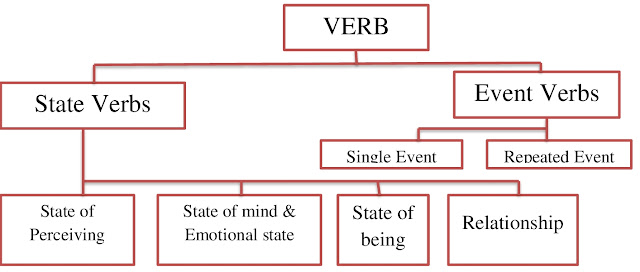State Verbs and Event Verbs Subject English Grade IX
State Verbs and Event Verbs
Subject English
Grade IX
- In modern English Grammar, Finite Verbs are classified in two broad categories. They are State Verbs and Event Verbs:
Examples of State Verbs
State of being
|
Verb |
Sentences |
|
be |
He is a very brave boy. We are Pakistani and they are Chinese. |
|
remain |
I remain silent in such cases. He remains dumb all along. |
|
Verb |
Sentences |
|
See |
I see you are a fool. |
|
Hear |
I hear a buzzing sound. |
|
Feel |
I feel tired. She feels ashamed of your behavior. |
|
Smell |
The rose smell, sweet. |
|
Taste |
Honey tastes sweet. |
State of mind & emotional state
|
Verb |
Sentences |
|
Love |
Everybody loves his mother. |
|
Hate |
you should not hate the por. |
|
Like |
Shumaila likes to wear white suit. |
|
Believe |
I believe that you are telling the truth. |
|
Forget |
I often forget his name. |
|
Appear |
The dog appears to be made. |
|
Verb |
Sentences |
|
Have |
I have a brother and a sister. |
|
Own |
Do you own a motor car? |
|
Owe |
You owe your own house. |
|
Belong |
This book belongs to me. |
|
Deserve |
The brave boy deserves praise. |
Event verb of single event and repeated events
|
Verb |
Sentences |
|
Buy |
I bought an orange from the market (Single
Event) |
|
Buy |
I buy oranges from the market regularly.
(repeated event) |
Difference between State Verbs and Event
Verbs
- State verbs are used only in non-progressive forms. But event verbs are used in both progressive and non-progressive forms.
|
Progressive |
Non-Progressive |
|
State Verb x I am believing you. (Incorrect) |
√ I believe you. (correct) |
|
Event Verb √ He is going to school. |
√ He goes to school. |
- Note: sometimes state verbs may be used in progressive forms, but then the verbs are changed into event verbs and don`t remain the state verbs.
Examples
- He has a dog. (State Verb)
- He is having his lunch. (Event Verb)
- I forget your name. (State Verb)
- I am forgetting names nowadays. (Event Verb)
- Honey tastes sweet. (State Verb)
- He is tasting honey. (Event Verb)
- Note: There is some state verbs which change
their meaning when used in progressive form, as;
- The boy looks (appear) like his father.
- The boy is looking (becoming) more and more like his father.
- You look (appear) bright today.
- She is looking at (seeing) the moon.





Comments
Post a Comment